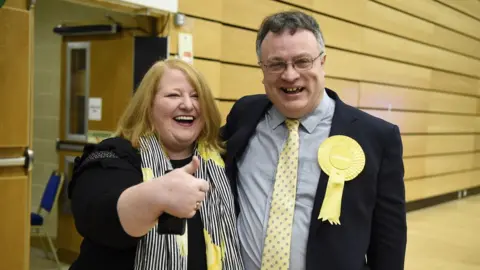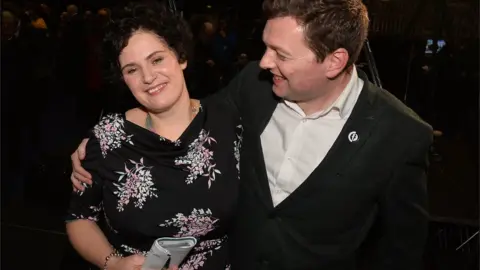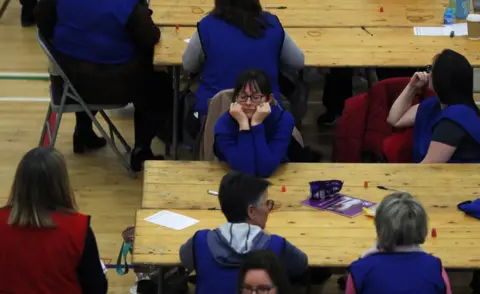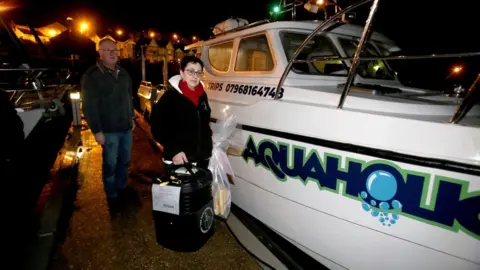Northern Ireland election results: DUP suffers losses
The Democratic Unionist Party (DUP) suffered a bruising night of general election results, losing two MPs including its Westminster leader.
Nigel Dodds lost his North Belfast seat to Sinn Féin's John Finucane while Emma Little-Pengelly was defeated by Claire Hanna of the SDLP in South Belfast.
SDLP party leader Colum Eastwood won Foyle with a thumping majority, while the Alliance Party took North Down.
A total of 803,367 votes were cast in Northern Ireland - a turnout of 62.09%.
The DUP and Sinn Féin both saw their share of the vote drop significantly compared with the 2017 general election - by 5.4% and 6.7% respectively.
The cross-community Alliance Party is set to come third in terms of vote share, with about 17%.
 PA Media
PA MediaIts deputy leader Stephen Farry won North Down, the first result declared in Northern Ireland.
In Fermanagh and South Tyrone, Michelle Gildernew of Sinn Féin retained her seat after a recount, holding off Tom Elliott of the Ulster Unionist Party (UUP) by just 57 votes.
The graph below shows the vote share change in North Belfast. If you can't see it click here.
Punishing night for DUP
Mr Dodds' defeat in North Belfast, a seat he had held since 2001, was symbolic of a torrid election for the DUP.
The party's deputy leader - a high-profile supporter of Brexit - will not be returning to Westminster.
The DUP also had high hopes of winning North Down for the first time but the constituency elected its first ever non-unionist MP with Mr Farry's victory for Alliance.
He defeated Alex Easton of the DUP by just under 3,000 votes.
Later, Ms Little-Pengelly's loss to the SDLP in South Belfast capped a disappointing night for the party.
She had won the seat from the SDLP two years ago by 1,996 votes but Ms Hanna took it off her this time with a big swing and a majority of 15,401.
The DUP propped up a minority Conservative government after the 2017 general election but has not been rewarded by voters.
DUP leader Arlene Foster said Mr Dodds' defeat was down to a "pan-nationalist front" after the SDLP opted to stand aside in the constituency.


It was noticeable that the DUP MPs who retained their seats used their victory speeches to urge the return of power-sharing in Northern Ireland.
After the last general election the DUP and Sinn Féin were riding respective waves of success at Westminster and felt no need to go back to Stormont.
Two and a half years on, with devolution still not back in place, perhaps some voters used their ballot to punish the big two parties this time.
Another round of talks aimed at kick-starting Stormont is due to begin shortly - the government has insisted a new Northern Ireland Assembly election will be called if that fails.
Given the latest results the DUP and Sinn Féin might not be keen on facing the wrath of some voters at the ballot box again so soon.
Read more from Jayne: 'Some bruising defeats for DUP and Sinn Féin'

There was better news for the DUP in East Antrim, East Belfast, East Londonderry, Lagan Valley, South Antrim and Strangford where its candidates were all re-elected.
In Upper Bann Carla Lockhart won, retaining the seat for the DUP after its previous MP David Simpson stepped down.
Ian Paisley won in North Antrim but saw his majority cut from 20,643 to 12,000.
Mixed picture for Sinn Féin
Mr Finucane's victory was a high point for the party - he secured a majority of 1,943 votes and it is the first time a nationalist has ever held the constituency - but it was a mixed picture elsewhere.
The SDLP won Foyle, which it lost to Sinn Féin in 2017, with a huge majority while Sinn Féin's majorities in South Down and West Belfast were cut.
Órfhlaith Begley and Francie Molloy were re-elected for Sinn Féin in West Tyrone and Mid Ulster respectively and their party colleague Mickey Brady held Newry and Armagh.
 PAcemaker
PAcemakerSinn Féin president Mary Lou McDonald said she was confident her party would compete to win Foyle in the future.
Mr Finucane is Lord Mayor of Belfast and his father Pat was a solicitor who was murdered by loyalist paramilitaries in 1989.
He said: "We have taken the opportunity to say North Belfast rejects Brexit, North Belfast is a remain constituency and wants a future as part of the European Union."
More good news for Alliance
The Alliance Party had a strong performance this year in the council elections in Northern Ireland and then at the European Parliamentary elections when it won a seat for the first time.
The party last won a Westminster seat in 2010 before losing it five years later but it will once again have representation in the House of Commons after Mr Farry's victory.
He won 18,358 votes to Mr Easton's 15,390 to take the seat formerly held by independent MP Lady Hermon.
North Down was represented by Lady Hermon from 2001 until she stepped down this year.
 PA Media
PA MediaIn his victory speech, Mr Farry said "voters had sent out a clear message that North Down wanted to remain [in the EU]".
He said there was no such thing as a good or sensible Brexit and that "all forms of Brexit are damaging for Britain".
The party came second in the DUP safe seat of Lagan Valley.
Sorcha Eastwood won 13,087 votes, slashing Sir Jeffrey Donaldson's majority from 19,229 to just over 6,000.
You can use the feature below to search for your constituency and see results. If you can't see it click here.
SDLP wins big in South Belfast and Foyle
The SDLP went into the night hopeful of taking South Belfast and Foyle but the scale of their victories in those seats was unexpected.
In Foyle, the seat once held by Nobel Peace Prize winner John Hume, Mr Eastwood won by 17,000 votes.
The graph below shows the vote share change in Foyle. If you can't see it click here.
Sinn Féin won the seat two years ago but the party's vote halved from 18,256 to 9,771 this time.
Mr Eastwood said Foyle voters had returned "someone to go to Westminster to fight your case and to stand up to Boris Johnson".
In South Belfast Ms Hanna overturned a DUP majority of 1,996 to win by more than 15,000 votes.
The wider picture
With one constituency left to declare, the Conservative Party has secured a majority of 78 at Westminster.
As a result the party will not require the DUP to help it achieve a working majority as it did in 2017.
But the DUP's Brexit spokesman Sammy Wilson said as Prime Minister Boris Johnson sought a trade deal with the EU there would still be opportunities to influence proceedings.
 Steven McAuley/McAuley Multimedia
Steven McAuley/McAuley Multimedia Sinn Féin's Alex Maskey said the result would take the "dead hand" of the Tory-DUP relationship away from the political process in Northern Ireland.
He predicted it would make it more likely that the DUP would do a deal with his party to restore devolved government.
The power-sharing executive at Stormont collapsed in January 2017 after a bitter row between the DUP and Sinn Féin over a flawed green energy scheme.
New talks aimed at restoring the executive are due to start on Monday.

- WHO WON IN MY CONSTITUENCY? Check your result
- NATIONAL PICTURE: The result in full
- ALL YOU NEED TO KNOW: The night's key points
- MAPS AND CHARTS: The election in graphics
- LAURA KUENSSBERG: Same PM, new map
- IN PICTURES: Binface, a baby and Boris Johnson

